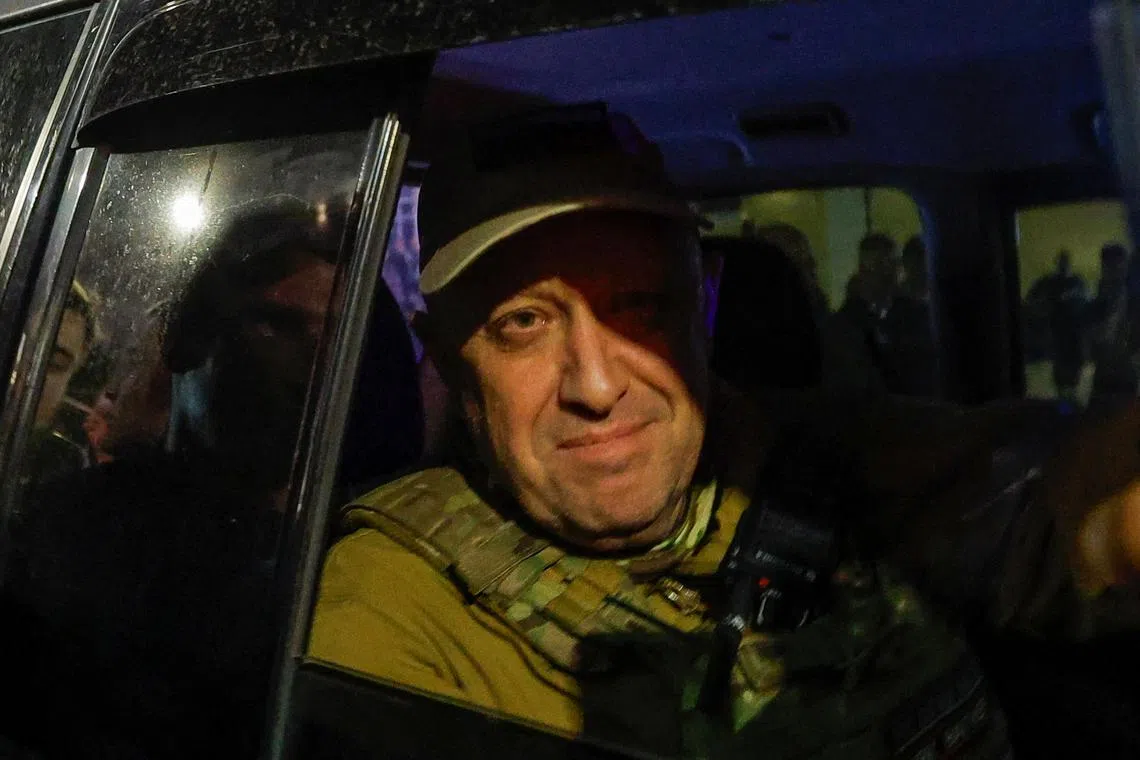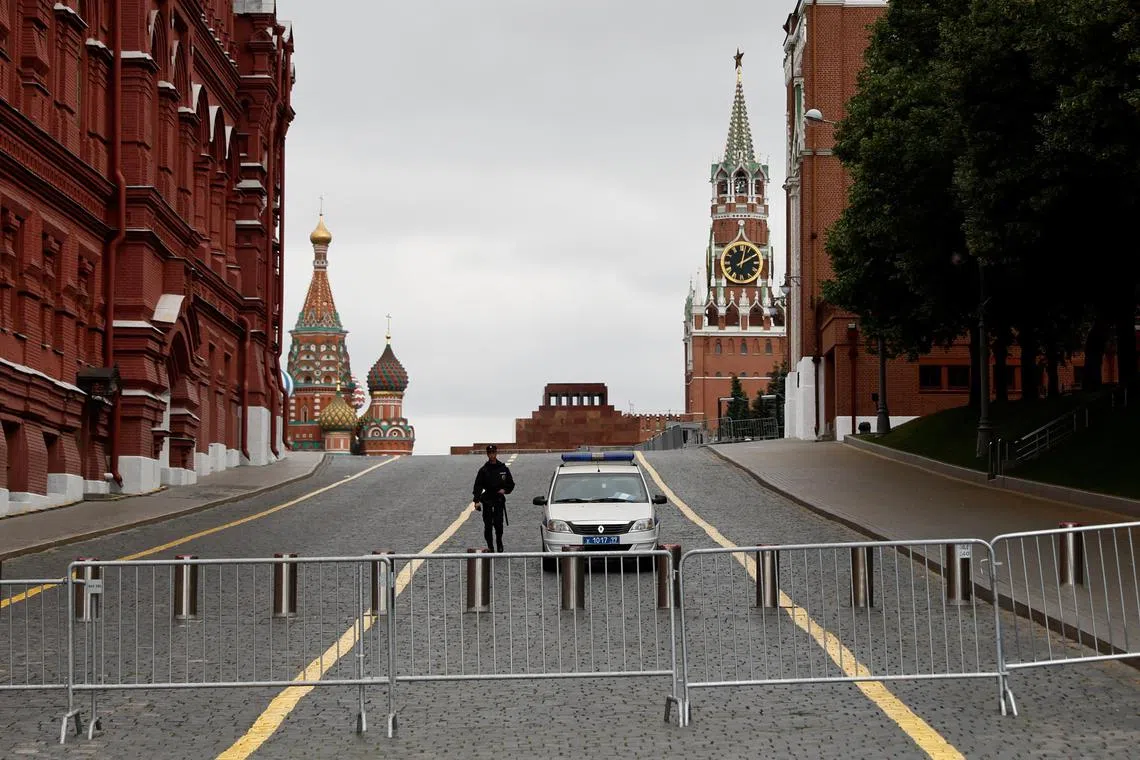Wagner halts revolt in Russia but Putin seen as weakened
Sign up now: Get ST's newsletters delivered to your inbox

Wagner mercenary chief Yevgeny Prigozhin leaves the Russian city of Rostov, after a deal was brokered to end the group's mutiny.
PHOTO: REUTERS
Follow topic:
MOSCOW - Wagner mercenaries were headed back to base on Sunday after Russia’s President Vladimir Putin agreed to allow their leader to avoid treason charges and accept exile in Belarus.
The agreement ended the immediate threat that Yevgeny Prigozhin’s private army could storm Moscow more fragile than had been thought
Security measures imposed under an “anti-terrorism operation” were still in place in Moscow on Sunday, and Prigozhin’s exact whereabouts were unclear.
He was last seen late on Saturday in a sport utility vehicle leaving Rostov-on-Don, where his fighters had seized a military headquarters, to the cheers of a group of young civilian bystanders, who came to shake his hand through the car window.
Trucks carrying armoured vehicles with fighters on them followed his car.
His troops had left the Rostov military headquarters, and the authorities in the Voronezh and Lipetsk regions northwards to Moscow said more forward Wagner units had also turned back.
There were reports that Wagner fighters had come as close as 400km from Moscow, while Prigozhin himself claimed that “in 24 hours, we got 200km from Moscow”.
His longstanding feud with military top brass over the conduct of the Russian operation in Ukraine boiled over on Saturday, when Wagner forces seized the Rostov base and advanced towards the capital.
Mr Putin denounced the action as treason and vowed to punish the perpetrators, accusing them of pushing Russia to the brink of civil war – only to then accept a rapidly cobbled-together agreement to avert Russia’s most serious security crisis in decades.
Within hours of Prigozhin’s surprise announcement that his forces would return to base to avoid “spilling Russian blood”
It had been a dramatic day of developments, with Mr Putin warning against civil war, and Moscow telling locals to stay off the streets.
Ukraine revelled in the chaos, stepping up its own counteroffensive against Russian forces in the country and mocking Mr Putin’s apparent humiliation.
Analysts said that the deal exposed weakness in the Russian President’s grip on power.
Belarusian leader Alexander Lukashenko said he negotiated the truce with Prigozhin. Moscow thanked him, but observers noted that an intervention by Mr Lukashenko, usually seen as Mr Putin’s junior partner, was itself an embarrassment.
Little is known about the deal, with Belarus officials saying simply that “negotiations continued throughout the day”.
Asked if Prigozhin had been given a guarantee that he would be able to leave to Belarus, Kremlin spokesman Dmitry Peskov told domestic media: “It is the word of the President of Russia.”
In Ukraine, President Volodymyr Zelensky’s senior aide Mykhailo Podolyak tweeted: “Prigozhin humiliated Putin/the state and showed that there is no longer a monopoly on violence.”
Russia insisted the rebellion had no impact on its faltering Ukraine campaign, and the day after the mutiny, said it had repelled new offensive attacks by Ukrainian forces.
Kyiv, however, said the unrest offered a window of opportunity for its long-awaited counteroffensive.
Ukraine also said on Sunday that the death toll from the Russian weekend strike on Kyiv rose to five, with two more bodies recovered from rubble in the capital’s Solomyanski district.
Experts said that the truce would probably not be the end of the story of Prigozhin’s feud with Moscow, with Mr Putin now being obliged to take measures to restore his authority.
Independent political analyst Konstantin Kalachev said: “The crisis of institutions and trust was not obvious to many in Russia and the West yesterday. Today, it is clear.
“The call for unity made by representatives of the elites only confirmed this. Behind this is a crisis of institutions and fears for themselves,” he said.
He noted that Russian leaders would be concerned by the sight of civilian onlookers applauding Wagner units in Rostov.
“Putin’s position is weakened,” he said. “Putin underestimated Prigozhin, just as he underestimated Zelensky before that... He could have stopped this with a phone call to Prigozhin but he did not.”
Mr Rob Lee, a senior fellow at the United States-based Foreign Policy Research Institute, said cooperation between Wagner and the Russian military was likely to suffer.
“Putin and the security services will likely try to weaken Wagner or remove Prigozhin,” Mr Lee tweeted.
“Given Wagner’s presence overseas, the greatest effects from this event may be felt in MENA (Middle East and North Africa)/Africa”, where Wagner has a large presence.
While the Kremlin appeared to have been caught on the back foot, US spy agencies picked up signs days ago that Prigozhin was planning to act, US media reported.
They began tracking indications that he and his mercenary force intended to move against the military leadership in mid-June, the Washington Post said, adding that US spy agencies believed Mr Putin was informed the Wagner chief was plotting his rebellion at least a day before it happened.
The US and its Western allies, who back Ukraine, were tight-lipped about the revolt amid concerns that Mr Putin’s control over the nuclear-armed country could be slipping.
Italian Foreign Minister Antonio Tajani told the daily Il Messaggero: “The myth of the unity of Putin’s Russia is over. This internal escalation divides the Russian military alliance. It’s the inevitable outcome when you support and finance a legion of mercenaries.”
China’s Foreign Minister Qin Gang met Russia’s Deputy Foreign Minister Andrey Rudenko in Beijing on Sunday, China’s Foreign Ministry said, but it released few details about what was discussed beyond “international and regional issues of common concern”.
Russia’s foreign ministry said China had “expressed support for the efforts of the leadership of the Russian Federation to stabilise the situation in the country in connection with the events of June 24”.
Before Prigozhin’s climbdown, Russian regular forces launched what one regional governor called a “counterterrorist operation” to halt the Wagner advance northwards up a main highway towards Moscow.
In the capital, the mayor urged Muscovites to stay indoors and declared Monday a day off work.
Security was tightened in the city centre, with armed men in flak jackets guarding the Parliament building and Red Square closed off to the public.

A police officer guards the closed Red Square in Moscow on June 24, 2023.
PHOTO: REUTERS
“I don’t know how to react. In any case, it’s very sad this is happening,” 35-year-old Ms Yelena told AFP, declining to give her last name.
All road traffic restrictions that had been imposed in Rostov, Lipetsk and other regions during the crisis have been lifted, state-run TASS reported, citing the federal road agency.
The measures came after Prigozhin announced his troops had taken control of the military command centre and airbase in Rostov-on-Don, the nerve centre of Russia’s offensive in Ukraine.
Responding to the challenge in a televised address, Mr Putin accused Prigozhin of a “stab in the back” that posed a threat to Russia’s very survival.
“Any internal turmoil is a deadly threat to our statehood and to us as a nation. This is a blow to Russia and to our people,” Mr Putin said, demanding national unity.
“Extravagant ambitions and personal interests led to treason,” he said, referring to Prigozhin, who began building his power base as a catering contractor.
As the insurrection force headed north through Voronezh and Lipetsk towards Moscow, the capital’s mayor announced that “anti-terrorist” measures were being taken.
Critical facilities were “under reinforced protection”, TASS reported, citing a law enforcement source.
While Prigozhin’s outfit fought at the forefront of Russia’s offensive in Ukraine, he repeatedly blamed Defence Minister Sergei Shoigu and Valery Gerasimov, chief of the general staff, for his fighters’ deaths. AFP

